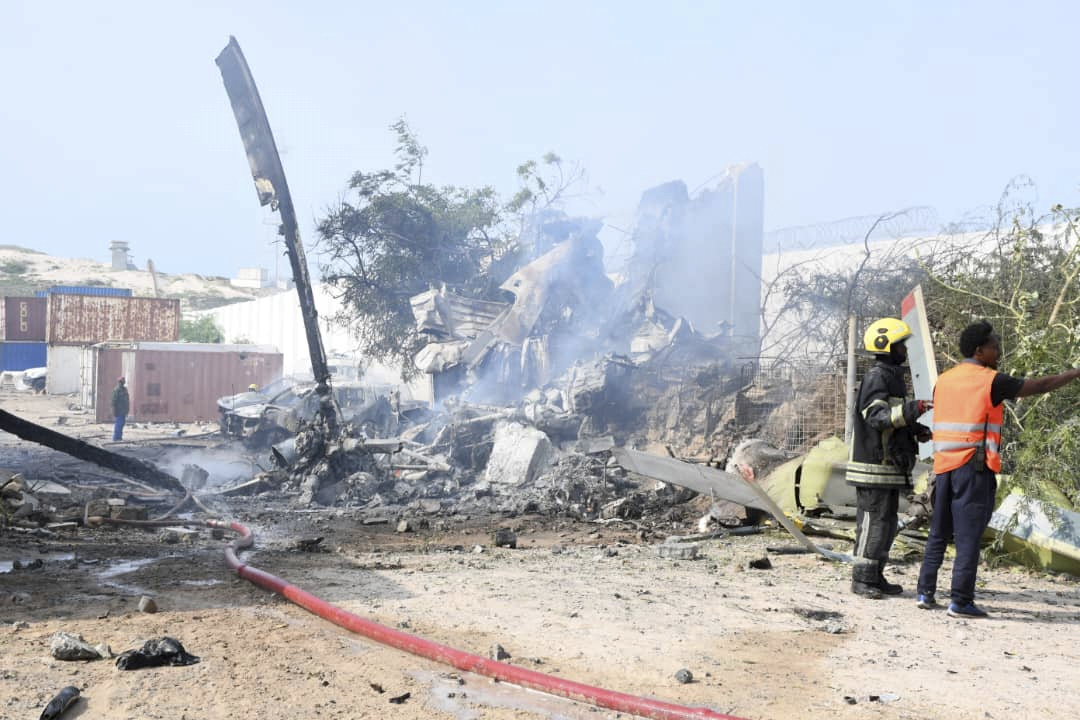
AU Helicopter Crash at Somali Airport Leaves at Least Five Dead

 :
| Updated On: 03-Jul-2025 @ 12:30 pm
:
| Updated On: 03-Jul-2025 @ 12:30 pmSHARE
A helicopter belonging to the African Union peacekeeping mission (AUSSOM) crashed at the Aden Adde International Airport in Mogadishu, the capital of Somalia, resulting in the death of five people on board. The incident occurred on Wednesday morning around 7:30 AM local time (04:30 GMT), as confirmed by the Ugandan military spokesperson Felix Kulayigye. The helicopter, which had taken off from Baledogle Airfield in the Lower Shabelle region, crash-landed just before touching down at the airport.
Out of the eight people aboard the helicopter, three survived the crash but sustained serious injuries and burns. According to Kulayigye, the impact of the crash triggered an explosion of munitions on board, leading to the destruction of nearby structures and injuring three civilians on the ground. The African Union Support and Stabilization Mission in Somalia (AUSSOM) confirmed the details, stating that the crash had significant consequences but that a few passengers did survive.
Eyewitnesses described the crash as violent and sudden. Abdirahim Ali, a resident living near the airport, recounted seeing a massive explosion followed by clouds of smoke billowing into the air. Omar Farah, an aviation officer who spoke to the Associated Press, reported that the helicopter appeared to spin uncontrollably before falling rapidly to the ground. These accounts highlight the severity and abruptness of the crash.
Despite the dramatic incident, airport operations were only briefly disrupted. The director-general of Somalia’s civil aviation authority, Ahmed Macalin Hassan, assured the public that the situation was under control. He confirmed that the runway was clear and fully functional, allowing flights to land and take off as scheduled. Minor delays were reported, but normal operations resumed shortly after the crash.
The AUSSOM mission currently deploys more than 11,000 personnel in Somalia, with significant contributions from countries like Uganda and Kenya. Their primary objective is to assist the Somali government in stabilizing the country and combating militant groups. The most significant of these groups is al-Shabab, an extremist militant organization affiliated with al-Qaeda. Al-Shabab has been a persistent threat in Somalia, aiming to overthrow the central government and impose its own rule based on a strict interpretation of Islamic law.
In addition to the helicopter crash, this week also saw a major success for Somali security forces in their ongoing battle against al-Shabab. According to state media reports, the Somali army successfully eliminated a high-ranking leader of the group in the Middle Shabelle region. The Somali National News Agency, citing military sources, reported that the leader was targeted and killed during an operation in the Dar Nama’a area. This marked a significant blow to al-Shabab’s leadership structure and demonstrated the Somali military's continued commitment to fighting terrorism.
Overall, the helicopter crash highlights the risks faced by international peacekeeping forces operating in volatile environments like Somalia. It also underscores the ongoing efforts of both international and national forces to restore peace and stability in the region, despite persistent threats and challenges from insurgent groups like al-Shabab.